Hillary Clinton on women’s equality and breaking glass ceilings
Hillary Clinton and journalist Barkha Dutt discuss breaking gender stereotypes and empowering women entrepreneurs.

Hillary Rodham Clinton is a lawyer, author, feminist activist, and former U.S. Secretary of State. Last year, as part of our 100,000 Women Campaign, we were honoured to have her join our Women Entrepreneurs Mean Business summit for a conversation with journalist Barkha Dutt, discussing women’s equality and leadership:
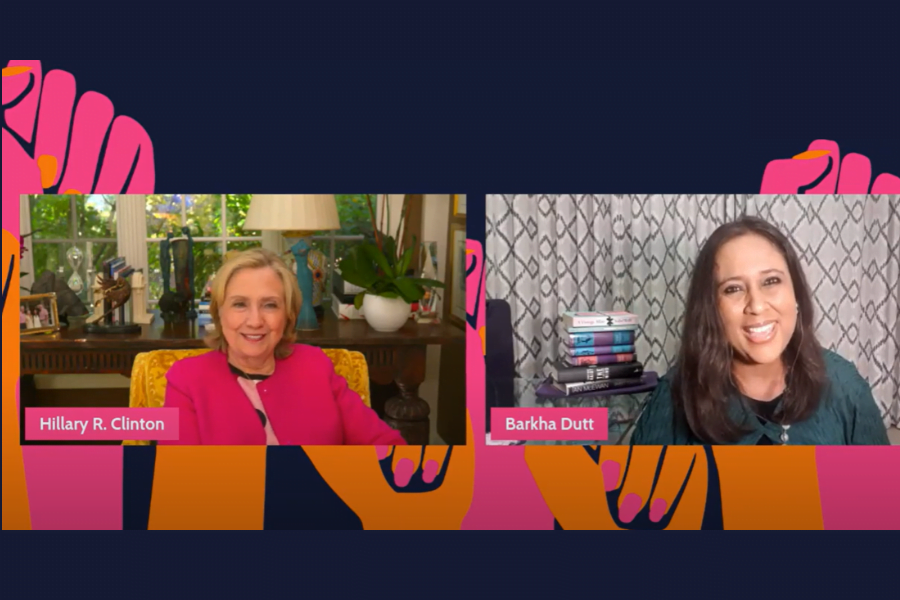
BD: I remember something you said to me once on a trip to India. You said that to be a successful and independent woman, you need to grow a hide as thick as the skin of a rhinoceros. You were channeling Eleanor Roosevelt, if I remember correctly.
Let me ask you a smaller question before we get to the big questions. Do you finally have a hide that is as thick as the skin of a rhinoceros, or not quite?
HRC: Oh, Barkha. I think most days I do, but there are still times when through frustration or disappointment or outrage, it seems we just have to redouble our efforts and keep working on behalf of women’s equality and the full participation of women in all aspects of society.
I still recommend to anyone in the public arena, you know this, you’ve been an active, excellent journalist for many years in the public eye, you just have to be prepared that you’re going to be criticised, critiqued, and attacked. Don’t let it get to you personally. Take criticism seriously but not personally.
Take criticism seriously, but not personally.
BD: I mean that’s brilliant advice, but like all great advice, it is easier to give it than to practice it. What has been the toughest thing for you to internalise about this advice that you obviously intellectually believe in 100%, but emotionally sometimes there is a gap between what your mind is telling you and what your heart is feeling.
HRC: You are absolutely right. Since I’ve had a lot of practice at it, it is probably a smaller gap than with many people. I will tell you that the fact that people in my country or around the world might believe some of the attacks, some of the lies, some of the crazy accusations that have been promoted online, which is now sadly the progenitor of misinformation and conspiracy theory, it does give me pause.
As hard as it used to be to stand up, to speak out, to take whatever came at you, to figure out how to keep going, it’s even harder now. It’s particularly harder because of the culture online and I think that is an especially difficult environment for young women to navigate.
So, yeah, it still does get to me, but I have ways of dealing with it, coping with it, ignoring it, responding to it. I’m very well aware, that for young women starting out in whatever field; politics, government, journalism, business, you name it, the environment online adds to the challenges that they face.
BD: That is such an important point because the world of social media was meant to democratize and create a level playing field. Instead, it has increasingly become a space that intimidates, abuses and seeks to silence women. A lot of the abuse online is gendered, sexualised, there are rape and death threats. I’m sure even with your thick skin, you were staggered the first time you had to confront it?
HRC: I was. During my 2016 campaign, I’ll be very blunt, I did not understand its reach and its influence. The things that were being said, were so obviously made up. They were crazy and as you rightly point out, Barkha, they were misogynistic and sexist. I thought, ‘Who is going to believe any of that?’.
Yet, what I’ve learned and what we are all learning is that sadly, many millions of people will be sucked in, will become addicted to information that is untrue, that is terribly biased. It’s a form of bullying to silence and suppress women’s voices, as you rightly said. I did not fully appreciate the impact of all those lies, how well organised they were, how they were propagated, and the influence that they had on voters and the press until after the election, when I was trying to make sense of what happened. I actually wrote a book called ‘What Happened’, because I wanted to make sure that whatever lesson I could draw from that experience would be shared and would perhaps help other people, particularly women, going forward.
BD: I was just looking at the revised focus from the World Economic Forum on how long it would take to close the gender gap, even the gender pay gap and it would take 137 years more. Now obviously, we aren’t going to sit around waiting for this day to come and be held back by this glacial pace of progress. As someone who has literally had to fight for every achievement in your life, what is that one sort of morsel that has kept you strong, that you would today want to share with younger women and female entrepreneurs?
HRC: It’s very simple. Keep going. Keep going no matter what happens, because the difference between someone who is able to keep pursuing her dream, someone who can make a difference not only in her own life, but in the lives of others is not that we get knocked down, not that we get insulted and attacked and demeaned as is often the case. It’s whether you get back up and you keep going. I learned that from my mother who had a difficult upbringing and I think her desire was to instill in me a sense of resilience and courage that no matter what path I chose, I would not let others define my life.
The pandemic disproportionally impacted women and girls. Of course, it affected the whole world, but more women left the workforce, more women are unable to get back into the workforce because they don’t have childcare. Their job may have disappeared. We see from the UN, so many girls are going to be sold into marriage because families have been knocked down economically. It is a truly major historical setback for the march of progress for women’s equality.
When I get knocked down, I obviously sum up the image of my mother and my heroes in the march for progress, but I also think about all the other women who are so heroic, whose name you’ll never know, who will never be interviewed by someone like you. But you know them, you know how brave they are, how determined they are. I want to keep giving them a voice and I want to keep trying to knock through the barriers for them as well.
I also think about all the other women who are so heroic, whose name you’ll never know... but you know them, you know how brave they are, how determined they are.
BD: I think that’s such a great point, because women like us get knocked down, we’ve got privilege and there are women without privilege, women of colour, women of lower caste in India, women who grow up in poverty. I was just listening to you and thinking, the one thing that irritates misogynists is that women keep going!
HRC: You are a 100 percent right! Oh thank you, my friend, you know that’s what I always say. When people say, well, how can you keep going after this happened and that happened and I say “That’s who I am”. I just love to confound my adversaries.
BD: Absolutely, it’s delightful to see them befuddled. You know, the Cherie Blair Foundation for Women just released a rather disturbing survey of woman entrepreneurs. 96 percent of the women that the Foundation polled said that they had encountered gender stereotypes. A majority of these women said that these stereotypes they were battling among friends and family.
When you hear these numbers, what does it make you think? Are you surprised?
HRC: Sadly, I’m not surprised. I do think there has been a great deal of change. I used to say that a lot of the men I knew were encouraging their daughters to pursue careers and education that they would never have wanted their wives to pursue. I do think that there are some generational changes and that we have many more male allies than we used to have, but the fact is that there are still so many messages given to girls.
One of the recent research studies I saw asked when a girl starts hearing messages that they are not as good as boys, that they are not as strong as boys, they’re not as smart as boys. That’s at five years of age! The gifts that are given to them, the language that is used around them, there’s a lot of “be careful of this” and “don’t do that” and many boundaries that are much narrower than they are for their brothers or cousins who are of the same age and background.
I think it starts in the family. That is the primary institution that socialises, raises, and sets expectations for all of us. More families need to recognise that we can’t begin at such an early age to limit the potential of half our population. I’m hoping that although it is a fact right now, that, as you rightly said in the study that the Cherie Blair Foundation for Women did, 96 percent of women entrepreneurs are saying that they’ve been discouraged, that they’ve gotten negative messaging from family and friends. I think we have to keep bringing that to public attention and we have to keep doing everything we can to hold a mirror up. If we hold that mirror up, whatever country we’re in, because this crosses all national boundaries, then we can say part of the unfinished business of the 21st century is the full equality of women and the full participation of us in every aspect of society.
Part of the unfinished business of the 21st century is the full equality of women and the full participation of us in every aspect of society.
Read our report on Gender Stereotypes and Their Impact on Women Entrepreneurs
Download the report (2.9MB pdf)
DownloadTo make the argument that Cherie does, and that I have certainly made for years as well, our economies, no matter what country we are in, will actually grow if we knock down the barriers to women’s participation. So just take one area, the economy, we will also do a better job if we start valuing the work that women do. I remember being in Africa back in the 90s and we were going from place to place and everywhere we went we saw women carrying firewood, women in the market, women in the field, we saw women working hard and I remember saying to an economist who was on this trip with us, “why don’t you start valuing the work that women do?” And he goes, “oh that’s the informal economy, there is no way to value it.” Well, if something is not valued, something can be dismissed or diminished. We have to do a better job at valuing the work that women already do outside of “the formal economy” and do everything we can to get more women into the formal economy in market stalls where they actually get to take home some of the money that they make. In marketplaces. There are so many opportunities but also in agricultural fields. If we had better markets to get the hard work harvest that women do, because women are the majority of smallholder farmers in the world, getting their goods to markets and making some money, there are a lot of things we could do that would value what women are doing right now.
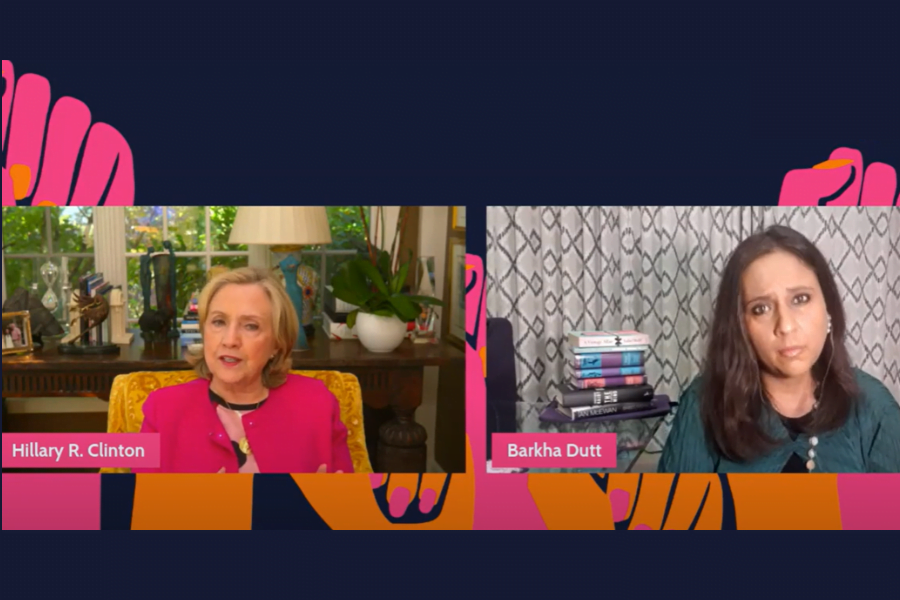
BD: Absolutely, but you know, I’m listening to you and I’m thinking that the feminist narrative, the fight for equality has focused almost entirely on equality at the workplace. Have we forgotten to talk enough about equality at home? Until there is equality at home, can there really be equality in the workplace? The number of brilliant women I know who have, you know, fallen out of the workplace, stopped working, given up their dreams, because they just don’t have the support systems. I mean, you wrote that “it takes a village”. Not every woman has a village.
HRC: That’s exactly right. I think they are totally interlocked. Even if a woman is in the workplace, and maybe even progressing in the workplace, she’s still doing the majority of the labour at home. We don’t have a sufficient support system.
We’re having this fight right now in the United States. People think women don’t need paid family leave or they don’t need better childcare support. How arrogant and dismissive an attitude that truly is. The fight continues because you can’t really have one without the other. I know, as you do, so many women who are at the edge of their nervous system because they’re working so hard in the home, so hard in the workplace, something has to give. The pandemic sadly pushed a lot of women out of the workplace because they just literally could not keep both going.
So yeah, you’re absolutely right. When we talk about women’s lives, we have to take all the aspects of women’s daily activities and obligations and look at those holistically.
BD: You are a parent to a daughter. How did you balance a parental need to protect your child from hurt but allowing her to find herself? Because I find that a lot of well-intentioned parents want to protect their daughters all the time and therefore those daughters are never able to fully dream big.
HRC: Oh, I think that’s such an important point. I will tell you a little story from my childhood. When I was about three or four, we moved from the city of Chicago to a suburb. It was post World War II, all of our fathers were World War II veterans returning home and it was that kind of baby boom environment. My father bought a house, we moved into it, and every day when I went out to play, I would be pushed down, I would be yelled at because the kids in the neighbourhood had a tight little band that they were proud of and I was this new kid.
My mother would dress me up and put a bow in my hair and I would come running back into the house, crying, every day for weeks. Finally, one day, I go running back into the house and my mother meets me at the door and she says to me “there is no room for cowards in this house, go back outside and stand up for yourself”. I thought my world was over, I can remember it like it was yesterday because, wow, I mean, and my mother later told me she was hiding behind the drapes in the dining room, looking out the window, shaking. She knew she had to make it clear to me, you’ve got to stand up for yourself. You can’t be living in that kind of fear.
So out I went. The kids were very surprised to see me. I did stand up for myself and we all became friends. I had to be brave and kind. Not one or the other. I had to do well in school, but I also had to have fun. My father used to say “when you are in school, work hard, when you are at home, obey your parents and when you are outside, have fun. Don’t confuse the three”.
BD: Tough love is important!
HRC: They gave me wonderful guidance and wonderful advice. Right now, we have an epidemic of what are called helicopter parents, parents who are constantly watching over their children. They want the best for their children and the like.
We live at a time when everything is magnified. With kids, if there is one terrible incident that happens, nobody lets their kids go outside, nobody lets their kids roam a free, learn the lessons that you learn when you’re growing up. I do think parents have to work harder at making sure they give the right balance between protecting and independence.
BD: That’s such a great point, may more parents be like that, in particular with their daughters.
Do you still have a big dream when you think about equality of the sexes, or do you feel like we are not going to see that in our lifetime? When you shut your eyes and you imagine an equal world, what’s the first thing you imagine to be different?
HRC: That we will have the breakthroughs that many of us have been working for and many who came before us, who were the pioneers.
Obviously, I hope we have a woman president at some point because of course, it may be symbolic but it’s an important symbol.
I hope that we continue to kind of hold ourselves accountable in politics, in business, in the media, all of us. Are we continuing to promote the double standard? Let’s be honest with each other. Let’s make some real hard decisions about how we talk about women. If we’re not going to say the same thing or have the same biases for men, that you know a man who is ambitious, everybody thinks “good for him”. A woman who is ambitious “oh, something wrong with her, stay away from her”. Those are the kinds of things that we have to do a better job.
A man who is ambitious, everybody thinks 'good for him'. A woman who is ambitious 'oh, something wrong with her, stay away from her'. Those are the kinds of things that we have to do a better job.
I like what you said about the workplace. It’s critical, but it starts in the home. I would also say that we have knocked down, in much of the world, many of the legal barriers. But the internal barriers, the mental attitudinal barriers are still there and how do we tackle that? The implicit bias still, unfortunately, is too prevalent.
I’m going to stay active in this as long as I can. I was thrilled to deliver a speech at Oxford last week about the first chair in Women’s History and the challenges that we still face. I don’t want this to get swept under the rug, I don’t want the online trolls to win. I don’t want all of the attitudes about women to set us back and put limits on my granddaughter’s life, I want my granddaughter and my two grandsons to go as far as their hard work and talent will take them.
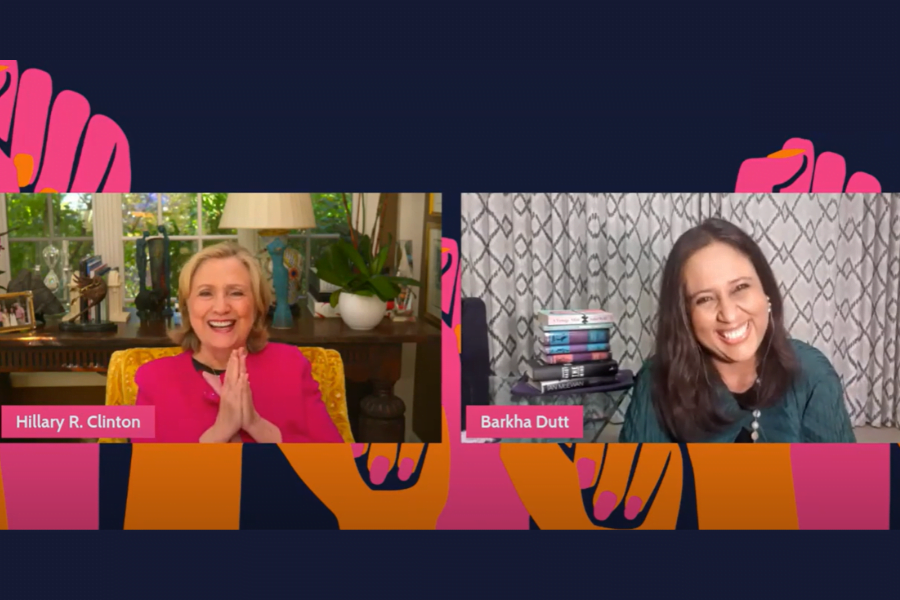
BD: I happen to be at Oxford right now and I’m just delighted to hear about this chair. Congratulations to you!
One thing I haven’t asked you about is the relationship between women and money. Since we’re talking about women entrepreneurs, one the gendered generalisms that might be true is that as women, we keep thinking our work will speak for itself. But it doesn’t, right? We have to go out and be unapologetically aggressive, even though we will be called names for it. And yet, we hesitate.
HRC: Oh you’re so right and I know in your career, in my career, we’ve experienced that, haven’t we? Look, I think that when it comes to money, too many women are still reluctant to negotiate, to bargain, to try to set a high value on themselves, to demand equal treatment.
We don’t have equal pay. We don’t have the same pay for the kind of work that is done in predominantly women industries. Care taking which is critical to how we live and die, in every society. Yet, they’re not paid the way that they should be. We have a lot of work to do on the economic side and I think there are three big challenges. I know that Cherie is addressing these, too.
Number one, every barrier that exists to women becoming entrepreneurs, small business owners, getting the capital they need to grow their businesses. They have to be exposed to the harsh sunlight of transparency and they have to be eliminated.
Secondly, the caregiving and the programmes and jobs that every one of us relies on at some point in our lives, whether we’re in a hospital or an old people’s home or at home trying to take care of people, whatever it may be, why don’t we value that work more? Well, the short answer is because women do it. So we have to keep fighting to raise the pay, raise the benefits, raise the respect given to caretakers.
And then, finally, I want to add that women have to support women, Barkha. It’s true that a lot of women are so focused on their own struggles that they don’t have much mind space or time to think about somebody else’s. The women who employ women in their homes, the women who employ women in their businesses, put yourself into their shoes. Think about what life is like for them. Try to be fairer, try to be more generous and supportive. So many women who are working in domestic jobs, caretaking jobs, in the home, in facilities, they need to be given more respect by all of us and that should start with us women giving respect to other women who are doing work that supports our lives and our opportunities.
BD: And I want to close by asking you if you had to take one pledge, one promise to yourself and to the larger community of like-minded women who have stars in their eyes and dream of reaching where Hillary Clinton did one day, what would that pledge be?
HRC: That I will do everything I can to support and mentor younger women on their journeys so that they have the confidence, the resilience, the know-how to gain the experience that is needed to make their own marks. I spend a lot of time speaking to groups, supporting them, individual women and girls, as well. I think at this point in my life that may be the highest and best use that I can offer to make sure that others go as far as their dreams will take them.
I will do everything I can to support and mentor younger women on their journeys.
BD: And I want to close by asking you if you had to take one pledge, one promise to yourself and to the larger community of like-minded women who have stars in their eyes and dream of reaching where Hillary Clinton did one day, what would that pledge be?
HRC: That I will do everything I can to support and mentor younger women on their journeys so that they have the confidence, the resilience, the know-how to gain the experience that is needed to make their own marks. I spend a lot of time speaking to groups, supporting them, individual women and girls, as well. I think at this point in my life that may be the highest and best use that I can offer to make sure that others go as far as their dreams will take them.
BD: Well I can tell you this, your entire journey and especially the times you got knocked down and you got back and you kept going, it has been an inspiration to millions and millions of women all across the world, certainly to me. Hillary Rodham Clinton, it is always a pleasure to catch up with you. Thank you. It has been a delight.
Read more from the Women Entrepreneurs Mean Business summit
-
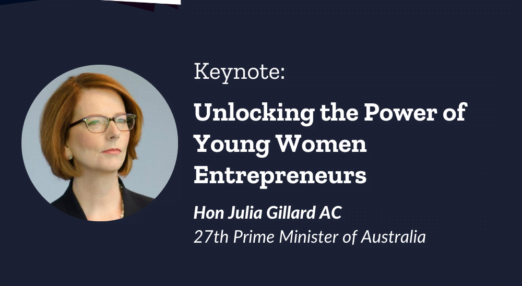
Hon. Julia Gillard AC – Unlocking the Power of Young Women Entrepreneurs
Keynote speech by Hon. Julia Gillard AC for the Women Entrepreneurs Mean Business summit, exploring and challenging the gender stereotypes holding women entrepreneurs back from success and equality. Because we won’t wait 250+ years for women to have economic equality.
Read more
-
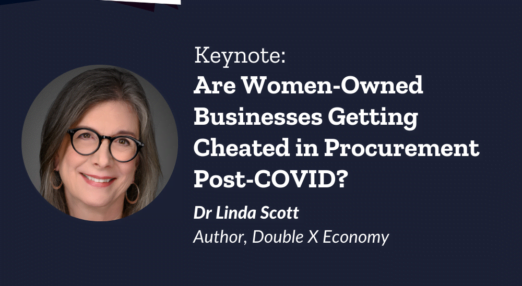
Linda Scott – Ending the Stereotypes: Are Women-Owned Businesses Getting Cheated in Procurement Post-COVID?
A keynote speech by Dr Linda Scott for the Women Entrepreneurs Mean Business summit, exploring and challenging the gender stereotypes holding women entrepreneurs back from success and equality. Because we won’t wait 250+ years for women to have economic equality.
Read more
-
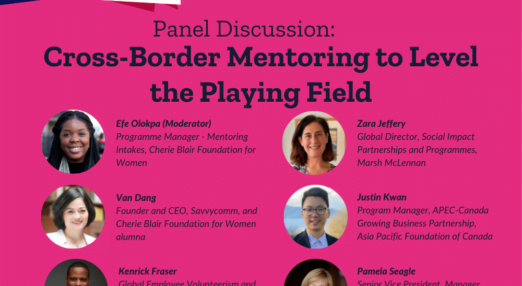
Panel discussion: Cross-Border Mentoring to Level the Playing Field
A panel discussion from the Cherie Blair Foundation for Women’s Women Entrepreneurs Mean Business summit, exploring and challenging the gender stereotypes holding women entrepreneurs back from success and equality. Because we won’t wait 250+ years for women to have economic equality.
Read more